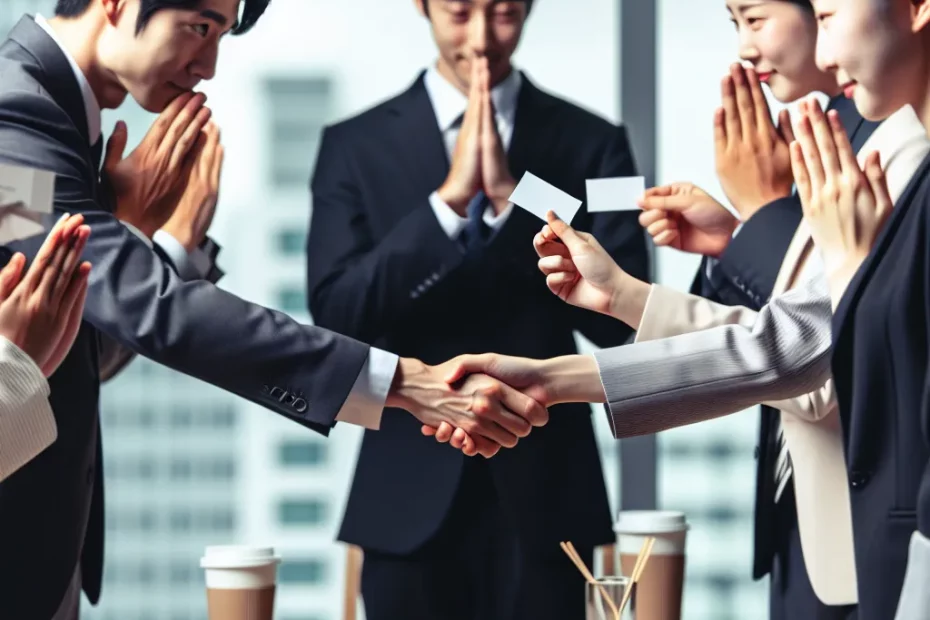In Korea, exchanging business cards is not just a formality, but a significant aspect of business culture. It’s a way to establish rapport, show respect, and pave the way for future communication. Understanding the protocol for exchanging business cards in Korea is crucial for making a positive impression in business settings. Knowing the etiquette tips can help you navigate these interactions smoothly and build fruitful relationships. Let’s delve into the nuances of business card exchange in Korea and explore its importance in Korean business culture.

Understanding Business Card Exchange in Korea
In Korea, the exchange of business cards is not just a formality, but a significant aspect of business culture. It is a ritual that holds great importance and carries a deep meaning in Korean business interactions. When engaging in business card exchange in Korea, there are certain protocols and etiquettes that one should be aware of to ensure a smooth and successful interaction.
Protocol
When exchanging business cards in Korea, it is essential to do so with both hands. This gesture shows respect and politeness towards the recipient. Upon receiving a business card, take a moment to look at it carefully. This demonstrates that you value the information provided on the card. Avoid immediately putting the card away or writing on it as this can be seen as disrespectful.
In Korean culture, the way you present and receive a business card speaks volumes about your professionalism and attention to detail. Make sure your business cards are clean, crisp, and free of any creases or marks. This reflects positively on your image and attention to detail, which is highly regarded in Korean business circles.
Significance
The exchange of business cards in Korea is not just about sharing contact information; it is a way to establish a personal connection and build trust with your business counterparts. By exchanging business cards, you are signaling your willingness to engage in a meaningful relationship beyond just the business transaction.
In Korean business culture, the information on a business card is highly valued. Make sure to study the card you receive carefully, as it often contains important details such as the individual’s title, company, and position. This information can help you understand the hierarchy within the organization and address the individual accordingly.
Conclusion
Understanding the protocol and significance of business card exchange in Korea is crucial for building successful business relationships in the country. By following the proper etiquette and showing respect for this tradition, you can make a positive impression and pave the way for fruitful collaborations. So, next time you find yourself in a business meeting in Korea, remember the importance of the business card exchange ritual and approach it with the respect and attention it deserves!
Protocol for Exchanging Business Cards in Korea
In Korean business culture, the exchange of business cards holds significant importance and follows a specific protocol. When engaging in a business meeting or networking event in Korea, the way you exchange business cards can leave a lasting impression on your Korean counterparts.
Offering Your Business Card
The first step in the business card exchange in Korea is to offer your card with both hands, holding it by the top corners facing the recipient. This gesture shows respect and is considered polite in Korean business etiquette.
Receiving a Business Card
When receiving a business card, take a moment to carefully examine it. This demonstrates your interest and respect for the person you are exchanging cards with. Avoid hastily putting the card away without acknowledging its details.
Using Both Hands
It is common practice to use both hands when receiving a business card in Korea. Receive the card with both hands and take a moment to study the information on the card before placing it on the table in front of you.
Presenting Your Business Card
When presenting your own business card, make sure that the information is facing the recipient, typically in Korean on one side and English on the other. This shows your consideration for the other person’s language preference.
Showing Appreciation
Remember to show appreciation for the business card you receive by nodding or bowing slightly. This small gesture of gratitude goes a long way in Korean business culture.
After the Exchange
After the exchange, it is common to keep the received business cards neatly organized on the table in front of you during the meeting. Placing them in your wallet or pocket immediately can be seen as disrespectful.
Importance of Business Cards
In Korean culture, the business card is seen as an extension of the individual, representing their professional identity. Therefore, handling business cards with care and respect is crucial in Korean business settings.
By following these protocols for exchanging business cards in Korea, you can navigate business interactions with Korean counterparts smoothly and leave a positive impression that can pave the way for successful business relationships. Remember, in Korean business culture, the small details matter, and the exchange of business cards is no exception!
Significance of Business Card Exchange in Korean Business Culture
In Korean business culture, the exchange of business cards holds significant importance. It is not just a formality, but a key aspect of building relationships and showing respect. When engaging in business meetings or networking events in Korea, the way you exchange business cards can leave a lasting impression on your Korean counterparts.
The Ritual of Exchanging Business Cards in Korea
The ritual of exchanging business cards in Korea is a carefully orchestrated process. When presenting your business card, make sure to use both hands and offer it with the Korean side facing up as a sign of respect. Receiving the card with one hand and taking a moment to study it before carefully placing it on the table shows that you value the information provided.
Business Cards as Extensions of Identity and Status
Business cards in Korea are not just pieces of paper; they are seen as extensions of one’s identity and status. The details on a business card, such as the individual’s title, company name, and contact information, are meticulously crafted to convey professionalism and credibility. Therefore, treating a business card with care and respect is essential in Korean business etiquette.
Establishing Hierarchy and Formality
The exchange of business cards also serves as a way to establish hierarchy and formality in Korean business settings. The senior member of a meeting or the individual with the highest status typically presents their card first. This gesture sets the tone for the interaction and helps to define the roles and relationships within the group.
Initiating Conversation and Building Connections
Furthermore, exchanging business cards in Korea is a way to initiate conversation and find common ground. By taking the time to read the information on a business card and asking relevant questions, you show genuine interest in the other person. This can lead to more meaningful connections and pave the way for successful business relationships.
In conclusion, the significance of business card exchange in Korean business culture cannot be overstated. It is a symbol of respect, professionalism, and a willingness to engage with others. By understanding and adhering to the customs surrounding business card exchange in Korea, you can demonstrate your commitment to building strong and lasting connections in the Korean business world. Let’s embrace this cultural practice with open arms and open minds!
Etiquette Tips for Successful Business Card Exchange in Korea
In the business world, exchanging business cards is not just a formality in Korea; it is a significant aspect of building relationships and showing respect. Understanding the etiquette and protocol behind business card exchange in Korea can make a lasting impression on your Korean counterparts. Here are some key tips to ensure a successful business card exchange in Korea:
🤝 Use Both Hands:
When giving or receiving a business card in Korea, always use both hands. This gesture shows respect and courtesy towards the other person.
🇰🇷 Respect the Hierarchy:
In Korean culture, hierarchy plays a crucial role in business interactions. Make sure to present your business card with the Korean side facing up and offer it to the most senior person first.
💼 Pay Attention:
When receiving a business card, take a moment to look at it carefully. This demonstrates your interest and respect for the person you are exchanging cards with.
🌟 Exchange Cards at the Beginning:
Business cards are usually exchanged at the beginning of a meeting or introduction. Be prepared to offer your card as soon as you meet someone for the first time.
🎎 Bow Slightly:
A slight bow when exchanging business cards is considered polite in Korean business culture. It shows humility and respect for the other person.
📇 Handle with Care:
Treat the business card you receive with respect. Avoid writing on it or putting it in your back pocket, as these actions can be seen as disrespectful.
🤗 Follow Up:
After receiving a business card, take a moment to acknowledge it and express your gratitude. This simple gesture can go a long way in building a positive relationship.
By following these etiquette tips for successful business card exchange in Korea, you can navigate business interactions with confidence and respect. Remember, in Korean culture, the way you exchange business cards can speak volumes about your professionalism and willingness to engage in meaningful relationships. 🌸
In conclusion, understanding the protocol and significance of business card exchange in Korea is crucial for successful networking and business interactions in Korean culture. By following the proper etiquette and tips for exchanging business cards, you can demonstrate respect, build trust, and establish meaningful connections with your Korean counterparts. Remember, a small gesture like exchanging business cards the right way can make a big difference in your professional relationships. So, embrace this cultural practice as a way to show your interest in building strong connections with the people you meet in the Korean business world.
